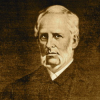Tryon Edwards

Tryon Edwards
Tryon Edwards was an American theologian, best known for compiling A Dictionary of Thoughts, a book of quotations. He published the works of Jonathan Edwardsin 1842. He also compiled and published the sixteen sermons of his great grandfather, Jonathan Edwards, on 1 Corinthians 13, the "Love Chapter", titling the book "Charity And Its Fruits; Christian love as manifested in the heart and life", which was thought by some to be the most thorough analysis of the text of 1 Corinthians...
NationalityAmerican
ProfessionTheologian
CountryUnited States of America
Some so speak in exaggerations and superlatives that we need to make a large discount from their statements before we can come at their real meaning
Mystery is another name for our ignorance; if we were omniscient, all would be perfectly plain
Whoever in prayer can say, ""Our Father,"" acknowledges and should feel the brotherhood of the whole race of mankind
If you would thoroughly know anything, teach it to others.
Age does not depend upon years, but upon temperament and health. Some men are born old, and some never grow so.
True humility is not an abject, groveling, self-despising spirit; it is but a right estimate of ourselves as God sees us.
We weep over the graves of infants and the little ones taken from us by death; but an early grave may be the shortest way to heaven.
Right actions in the future are the best apologies for bad actions in the past.
Seek for duty, and happiness will follow as the shadow comes with the sunshine.
Every parting is a form of death, as every reunion is a type of heaven.
Some of the best lessons we ever learn we learn from our mistakes and failures. The error of the past is the wisdom of the future.
Between two evils, choose neither; between two goods, choose both.
Quiet and sincere sympathy is often the most welcome and efficient consolation to the afflicted. Said a wise man to one in deep sorrow, I did not come to comfort you; God only can do that; but I did come to say how deeply and tenderly I feel for you in your affliction.
Any act often repeated soon forms a habit; and habit allowed, steady gains in strength, At first it may be but as a spider's web, easily broken through, but if not resisted it soon binds us with chains of steel.